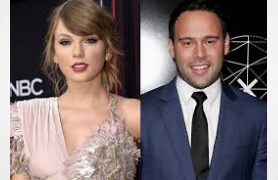At a Harvard Law School event, an expert in digital exploitation of intellectual property says Taylor Swift singlehandedly shifted composition copyright considerations
When Taylor Swift began re-recording her old albums and releasing the new, improved “Taylor’s Version,” she did more than delight a nation of Swifties. She also opened significant questions about the role of intellectual property in contract law, and possibly tipped the balance toward artists.
According to Gary R. Greenstein, a technology transactions partner at Wilson Sonsini, the Swift affair is one of many that makes these times especially interesting for copyright law. Greenstein’s current practice focuses on intellectual property, licensing, and commercial transactions, with specialized expertise in the digital exploitation of intellectual property. He appeared at Harvard Law School on March 28 for a lunchtime talk, which was presented and introduced by Chris Bavitz, the WilmerHale Clinical Professor of Law and managing director of the law school’s Cyberlaw Clinic. “I have been doing this for 28 years now and there is never a dull moment,” Greenstein said.
Greenstein placed the Swift story in the larger context of music copyrights. In music, he explained, there are always two copyrights. The first is for the musical work itself, and this is usually controlled by the composer/songwriter, or by a publishing company acting on their behalf. The second is the “master,” the recorded performance of the work, and this is usually controlled by the label.
Whenever a song is played in public, one or both of these entities gets paid. In many cases, there are multiple copyright holders — the Bruno Mars hit “Uptown Funk” has six authors — or multiple recordings of the same songs (he noted that Bob Dylan’s “All Along the Watchtower” has hundreds). “From a licensing point of view, this can be a nightmare,” Greenstein said.
In 2005, a teenaged Taylor Swift signed on to the Big Machine record label and became a global superstar by the time she left the company in 2018. By that time, she’d recorded six albums for the label, all multimillion sellers.
Soon afterward, Big Machine was purchased by her longtime business nemesis — “to Swifties, the hated Scooter Braun,” as Greenstein called him. (The two had longstanding bad blood, and Swift had referred to Braun as a bully and a manipulator). Braun in turn sold Big Machine, including the Swift albums it owned, to another company, Shamrock Holdings, for $420 million. Greenstein said that he was involved in the Big Machine deal but was not free to share details.
Rather than buy into this agreement, Swift announced she would remake the albums. Under her new record deal with Universal Music Group, she’d now own whatever masters she produced. Because she is usually the main songwriter, she would already have rights to the musical works. As the author and owner of her newest masters, Swift now has majority control of her work. Hence, Greenstein said, he’d need to pay Swift royalties if he played one of her songs during the lecture.
Read on at
https://hls.harvard.edu/today/how-taylor-swift-changed-the-copyright-game-by-remaking-her-own-music/




